Let's Reboot... Syndicate
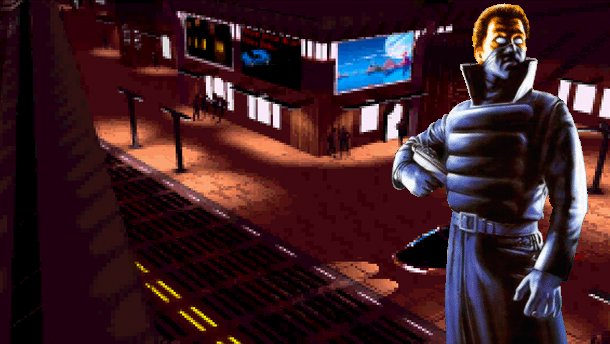
“Let's Reboot” takes a look back at a classic in need of a new outing or a beloved series gone stale and asks how it might be best redesigned or given a kick up the backside for today's gaming audience. The Rules: Assume a free hand, and a decent budget, but realistic technology and expectations. This week's sacred cow – one that's already been turned into low-grade burger meat, but never mind.
Dark streets. Electric nightmares. Perpetual rain drips down the side of silent chrome buildings, as the elite inside stare down at the dots below that dare to think of themselves as people. It's a cyberpunk nightmare, where cybernetic Agents act with impunity, and ruthless ambition is as dangerous as any gun. This is the world of Syndicate, dragged kicking and screaming back from the 90s.
But you know what it's not? It's definitely not a first-person shooter!
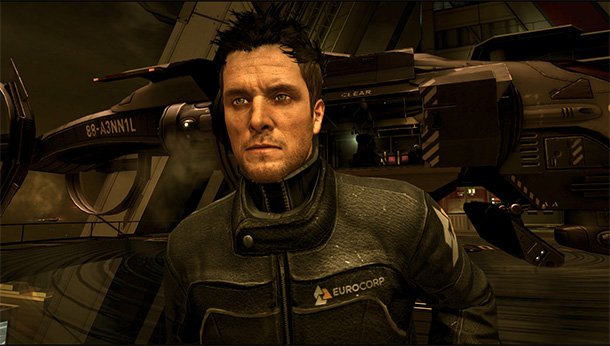
No, Syndicate wasn't the worst shooter ever made, but its pitiful sales - 150,000 or so, according to EA - have a certain karmic element to them for anyone who remembered Bullfrog's original games. It's not a series about individuals caught up in Deus Ex style conspiracies any more than XCOM should spend missions teaching Sectoids of this Earth thing we call 'love'. At least, not outside FanFiction.net.
For our reboot, we're going back to the series' strategy origins, with a top-down view closer to Syndicate Wars than the original's isometric approach, and with our main character observing the action from hacked orbital satellites rather than literally flying over the action in an evil blimp.
Let's remind ourselves of it first, shall we? Here's a quick video, courtesy of YouTube.
And for comparison, this is the sequel, Syndicate Wars...
Keep up to date with the most important stories and the best deals, as picked by the PC Gamer team.
The story this time around though is slightly different, both to return to the original game's Rise To Power theme, and to reinforce many of Syndicate's more interesting concepts as mechanics. For starters, this time you're not an executive in the Syndicate that controls the world - which is no longer EuroCorp, but something far more globally reaching to the point of not needing a specific name any more. At one point EuroCorp was probably part of it, as if it matters. It's not like Syndicate lore is exactly deep.
Instead, you start out as a a street gang leader in what we'll simply call The City - a San Andreas style megacity to be exact. It's rich in the north, poor in the south. The higher you go, the nicer but more restrictive things get. Down in the slums, it's not quite lawless, but the law isn't particularly interested in anything but vaguely keeping the peace. You stay out of the Syndicate's way, it has no reason to get in yours. Of course, staying out of its way wouldn't be particularly fun, would it?
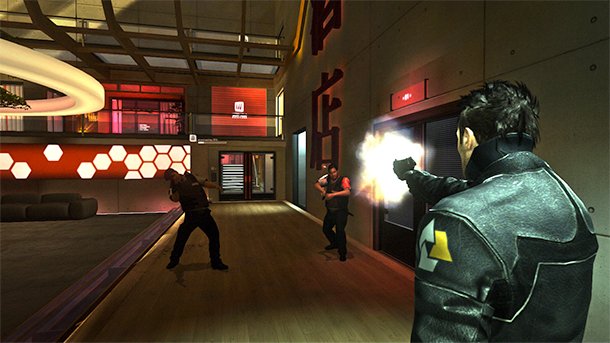
For a couple of missions, things are small-scale. You still have a team of up to four guys (and gals - as with the original, Syndicate is gender-neutral), but they're just regular squishy humans. You're the brains of the operation, working in safety from a panic room elsewhere. They're the muscle, packing primitive pistols and uzis at most, with the option to jack them up with adrenaline for quick bursts. They're not much muscle though, as becomes clear as you find yourself in a turf war against a rival gang that's after your territory but has much better resources to bring to the fight. More guys. More Uzis.
Then your luck changes forever. An earthquake forces a Syndicate convoy to change its route through the city towards your part of town. Nobody would ever dare attack one, which means it's relatively unguarded - easy pickings to a gang on the edge of extinction anyway. You assault it, hoping for valuables, but only getting some mysterious encoded blueprints... and a game changer. An Agent, a cyborg killing machine, being transported to HQ for activation and deployment.
Having been stuck with regular humans for a couple of missions, an Agent is like suddenly being handed the keys to a battletank. He wields a Gatling gun, bullets bounce off his upgraded skin, and his response to adrenaline is many times that of a regular person. With him on your team, and some squishies for good measure, the local turf war moves from no-win situation to one-sided massacre. The entire area is yours. There's just one tiny problem. The Syndicate is now angry, and it never, ever forgives.
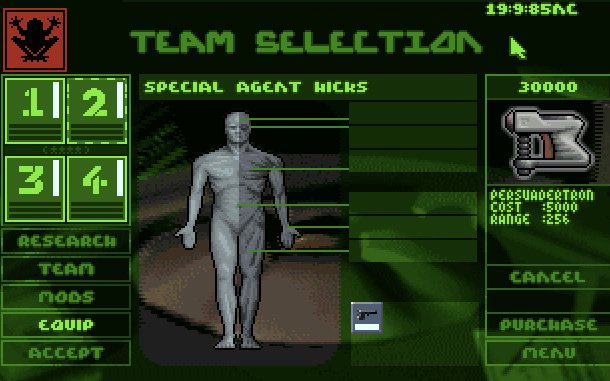
At this point, the game opens out to more of an XCOM style system, with the goal being to conquer the city and establish it as a city-state. This is done with a mix of randomly generated missions, with opportunities springing up to earn resources or earn points with various factions, and dedicated narrative missions that unlock when certain milestones are reached. Critical missions can be replayed until won. Non-critical missions can be failed, though won't cost too much if that happens.
The strategic layer is nowhere near as detailed as, say, XCOM (itself not particularly complex), but still allows for the feel of a campaign rather than just a series of missions, and for the Syndicate to seem like an active threat - pressing down on your growing empire as you leave the slums and start working up through the commercial and entertainment districts to its seat of power at the top of the map. Conquering that isn't quite the end though, because it's no good taking a city if you can't keep it. When it's yours, there's a final act where the the Syndicate launches a series of increasingly powerful attacks and incursions from outside that trash much of the place, with missions revolving around holding them back, facing off against their most elite agents, and figuring out a way to keep them out for good.
We'll get to that.
Missions take place both indoors and outdoors, with the nicer scenery you encounter later on conveniently coming alongside the more destructive weapons to trash it all. And that's okay. You're only dealing with a chunk of each sector at a time, so you can flatten it without ruining anything important. At the end of the mission you might be told how much damage you did, but only for fun - nobody ever presents a bill. Short of gunning down someone you had to protect, you can do what you like.
To help the cause, you develop a web of allies in various fields who can help out for a price - people like a black market smuggler who organises your guns, a doctor who can slip you information on new upgrades to research, and a hacker who can tap into the Syndicate's news feed and highlight potential trouble. Each has a personality, and occasionally asks for favours as well as simply money to fund their actions on your behalf. In return, you can get bonuses like faster healing, or tactical intel.
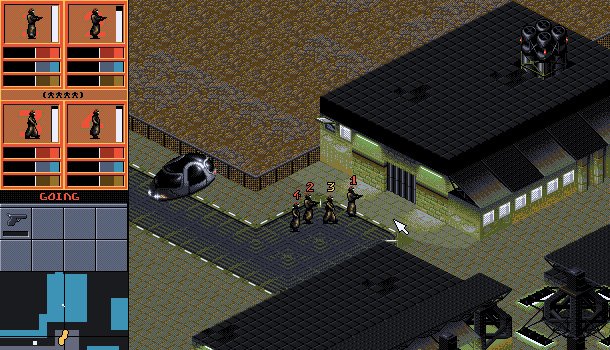
Unlike the original Syndicate though, research is fairly limited. It was a cool idea, but too easy to fall behind. Here, things unlock based more on story progression - an assault on a weapons factory for instance adding things like rocket launchers to your potential arsenal. Its effectiveness is based on only Agents getting to use heavy weapons, them only being able to carry so much, and having a unlockable skill tree that controls their proficiencies. They can't actually die in missions, but they can be incapacitated, potentially leaving you to fill slots with squishy humans or only field a partial team until their repair nanobots or whatever have restored them to combat readiness.
Regular, non-updated humans can be equally effective though. They just have to be sneakier about it, using toys and technology instead of marching in guns blazing. By having to spend much of the game with at least a couple, and sometimes rely entirely on them, the tactical potential is doubled - even if they do initially seem like reservists next to the elite cyborg Agents. In some cases, they're actually a better choice - when you don't want things to get overly chaotic in a guarded area, or there are enemy Agents around who will immediately make their opposite numbers but aren't actively on alert.
Whatever the makeup of your team, the core action is similar to the original Syndicate games, though with weapons capable of bringing down buildings held back a little, and the AI blessed with a piece of code called StopWalkingIntoFlamethrowerJetsYouMorons(); You spend most of the missions outside your own territory, but if it's your own - say, a defence mission - the police actively help you when a firefight breaks out. Objectives though are relatively standard fare. Kill the other side's agents, then get to a contact, for instance, or blow up a road to stop a Syndicate convoy in its tracks. Wherever possible though, missions are kept general - a set task, with the toys to accomplish it as you choose.
As far as specific tasks go, it's a tactical shooter. There's only so many things that can be asked, outside of special situations. Assassinate that. Protect them. Retrieve this. More specifically, missions can also involve capturing new Agents to bolster your collection, plot related things like your original human soldiers rebelling at having been replaced by an increasing army of cyborgs who get all the love these days, extra-hard missions that unlock particularly fun (if not the most powerful) weapons, and being offered the chance to make your city ad-supported by putting TV screens advertising Ghost In The Shell on every street corner and having the marketing guy responsible shot in the cock. Grrrr!
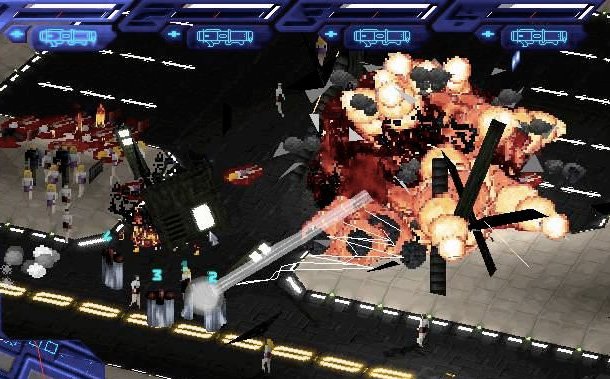
When sides come to blows, Agent vs. Agent fights are all-out slugfests - incredibly powerful cyborgs unleashing the fury against each other. Why would you ever bring squishy regular humans into that? Not for a straight-up fight, which they'll always lose. They have a few advantages of their own though, including anonymity and being able to blend into the crowd (technically, lie low for a while) if police or other military units are put on alert, whereas Agents are priority targets from at the latest the moment they pull a trigger, and being faster, allowing for smart play with toys like timebombs and calling down orbital strikes in areas that Agents wouldn't be able to get to without having an all-out firefight. Agents don't lower themselves to the likes of planting bombs. They're broadswords, not scalpels.
Oh, and of course, there's the Persuadertron. Of course it has to be in there. It's one of Syndicate's coolest toys; the power to create an army at will. Given its phenomenal power though, it has to be earned. As with all the fancy weapons, it's a toy for Agents only. Out of the box, its limit is a couple of guys though - hijacking a policeman's mind for instance for a bit of extra firepower, or potentially to get through a restricted area and place a bomb. (Alternatively, a human character could perhaps steal a uniform and get through as long as there isn't an alert going on at the time, if that seemed fun)
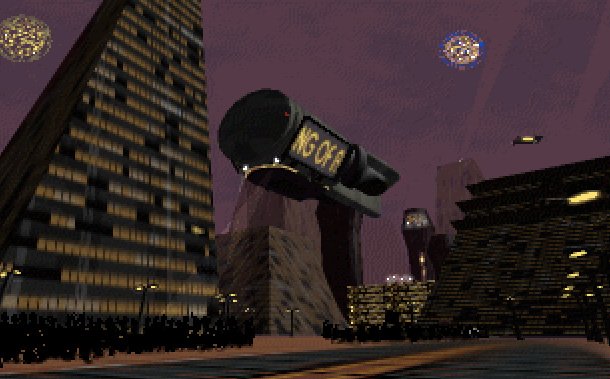
To control crowds though, for the most part, means having an Agent devoted to its mastery - each upgrade allowing for more people to come under its spell. That's because there's an active limit to how much their cyborg brains can process. However! The technology can also be used in two other ways - a Scramble bomb placed by a non-Agent that will turn everyone except enemy Agents in a small area into a hyper-aggressive rioter, and one of the final missions when the city as a whole is yours and the Syndicate sends its biggest guns to put down what's now a full-scale rebellion. By this point though, you've wired the Persuadertron into some real computing power and can now mobilise the entire city into an army at will. With that power, the final level isn't so much a mission as a massacre.
This is the ultimate end goal - to create a city state that the Syndicate can no longer enter, but can't afford to destroy either. Along the way, your initial suppliers have become generals, your single Agent has become a template for your own programme that's ready to start building them rather than having to capture them. From there, the rest of the world beckons... but that's another story.
Not a story about an Agent with a conscience though. That would be Silly.

